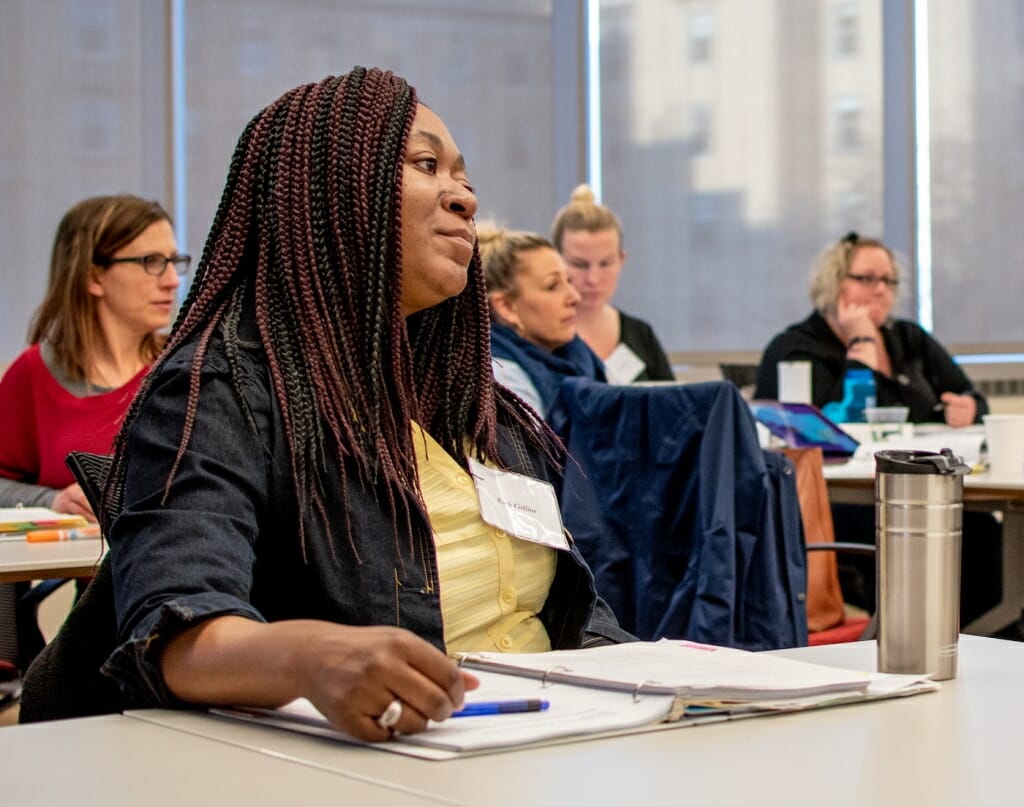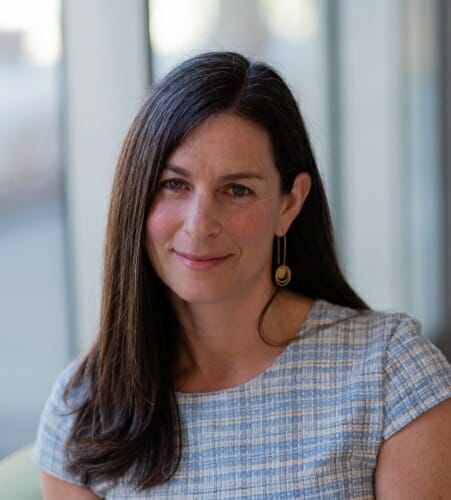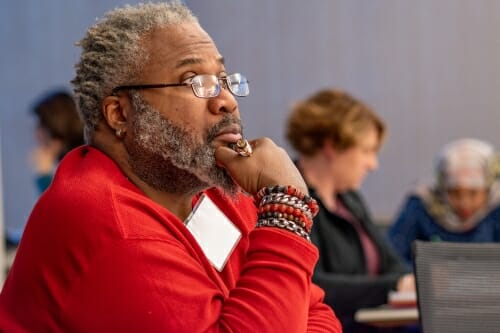WARF’s UpStart program supports women and BIPOC entrepreneurs

Ruth Collins listens during an Upstart class in winter 2019. WARF’s UpStart Program trains cohorts of women and BIPOC entrepreneurs about every aspect of business ownership. Collins started a business called Restoration Soap & Bodycare. Submitted photo
From February through June, we will highlight the ways that UW–Madison powers the state’s economy through research and innovation, educates the next generation and reaches out to Wisconsinites to improve their lives. February’s theme is Economic Prosperity. Watch for more at #CantStopABadger and #UWimpact on social media. Your support can help us continue this work.
Diverse boards and teams are known to collaborate more effectively and contribute to business success.
Every fall and winter for ten weeks, WARF’s UpStart Program trains cohorts of women and BIPOC entrepreneurs about every aspect of business ownership, from social media marketing to buying insurance to writing a business plan.

Katie Rice
“UpStart’s focus is to elevate and strengthen Madison’s entrepreneurial ecosystem,” says program director Katie Rice. “It’s to everyone’s advantage to have resilient and diversely owned businesses.”
Participants receive six free months of business planning software, other funding opportunities, and ongoing access to resources and instructors.
“UpStart provides opportunities that are approachable, building confidence in individuals who didn’t necessarily view themselves as entrepreneurs or feel comfortable going into a bank and asking about small business loans,” says Rice.
Michelle Somes-Booher, director of the Small Business Development Center (SBDC) at UW–Madison, and her team create the UpStart curriculum, which is taught by SBDC staff and business community members.
“We have had UpStart grads go on to take our Entrepreneurial Training Program and other classes, and they have become SBDC consulting clients,” says Somes-Booher.
Launch business in phases
“UpStart was full of valuable resources and so well-guided that it helped ensure my business moved from a creative idea to an impactful reality,” says Roxie Hentz, Founding Executive Director of CEOs of Tomorrow, which provides entrepreneurial education for Madison students. “The guest instructors provided every aspect of expertise.”
CEOs of Tomorrow launched in 2016 with a three-week summer course for teens and now offers seven programs.

Lonnie Brigham Jr. in an Upstart class. Participants in Upstart receive six free months of business planning software, other funding opportunities, and ongoing access to resources and instructors. Submitted photo
“The Lean Startup methodology taught me how to launch my business in phases, so I can test it,” says Hentz, who holds an MBA and ran her own business for 17 years before joining UpStart. “Here I am, five years later, serving 100 kids a year, with eight employees.”
CEOs of Tomorrow has helped launch 100 student-led businesses.
“I’m creating an ecosystem of entrepreneurs and entrepreneurial thinkers who will go into the community, largely in Madison, and shape the economic landscape of our city,” Hentz says.
UpStart also contributes to the gig economy.
“The education, resources, and support provided by UpStart help de-risk opportunities for side gigs that participants consider pursuing,” says Rice. “Especially during this pandemic, side hustles can provide extra income or replace lost income.”
‘UpStart is like a superhighway’
Shalicia Johnson, an early childhood educator for 26 years, runs ArrowStar Photography out of 3rd Eye Collective on Monroe Street.
“UpStart is like a superhighway,” Johnson says. “Every cohort adds minority business enterprises, women-owned business enterprises, and freelancers to the economy.”
This expands customers’ options.
“UpStart entrepreneurs have really unique ideas and businesses, so UpStart is impacting the economy by offering things you can’t get anywhere else,” says Johnson. “That brings revenue to small businesses and provides more choices to consumers.”
Plus, UpStart alumni support each other.
“There’s an alumni group of fantastic people, who had an idea established and needed support, or started from scratch and launched from UpStart,” says Johnson. “We’re connected to each other, and we want to support minority- and women-owned businesses.”
Teaching folks who’d been forgotten
Jasmine Banks works full-time at Operation Fresh Start and launched Perfect Imperfections in 2016. Friends who had purchased her handcrafted body and home products suggested she apply to UpStart.
“UpStart was the perfect space to open my eyes to the things I needed to do and gave me courage to just try,” says Banks. “My hope for Perfect Imperfections is that this is a legacy for my family. My heart is here. This is my community to give back to.”
Banks’ family has been in Madison for five generations. Banks says she would love for her business to have the kind of economic impact Oscar Mayer had on Madison’s middle class. She sources from local vendors and is brainstorming ways to connect young people from Operation Fresh Start to her business.
“How can I give them real-life experience?” Banks asks. “We need to nurture the young people who will stay in this community.”
Banks believes UpStart has a groundbreaking impact.
“They are taking the time to teach, train, connect, network, and nurture folks who have been forgotten, left in the corner, and unacknowledged,” Banks says. “UpStart is creating the world I would like to live in.”
UW-Madison contributes $20.8 billion per year to the Wisconsin economy, and UW–Madison related start-ups contribute an additional $10 billion. Read more here.
Subscribe to Wisconsin Ideas
Want more stories of the Wisconsin Idea in action? Sign-up for our monthly e-newsletter highlighting how Badgers are taking their education and research beyond the boundaries of the classroom to improve lives.
Tags: diversity, The Wisconsin Idea, UW impact, WARF



